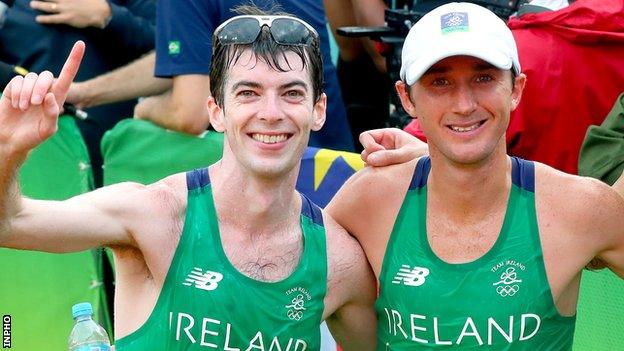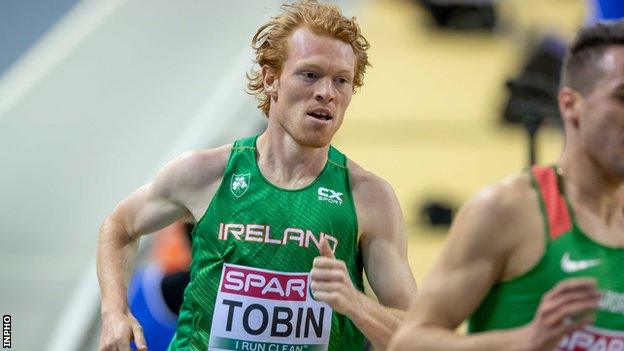Kevin Seaward: Irish marathon runner believes Olympics probably won't happen
- Published

Seaward (right) and Paul Pollock (left) both represented Ireland in the Rio Olympic marathon and have qualified for the Tokyo event
Irish marathon runner Kevin Seaward feels there is "every likelihood" this year's Olympics will not take place because of the coronavirus crisis.
Seaward ran the distance for Ireland at the Rio Games and set a new Northern Ireland marathon record of 2:10.09 last month to seemingly book his Tokyo spot.
"The Olympics symbolise something more than a Games at the moment," he said.
"It would be a beacon of hope for people. But I honestly don't think they are going to happen."
The International Olympic Committee (IOC) is continuing to insist the Games could still begin on 24 July despite the pandemic but several high profile athletes including British heptathlete Katarina Johnson-Thompson have criticised this stance.
World champion Johnson-Thompson says training has become "impossible" because of the restrictions around coronavirus and has had to move back home from her normal base in France after the country was put on lockdown.
As a distance runner who does most of his workouts alone and rarely uses a track, Seaward says his training is not being hindered to the same extent as the Englishwoman, but nevertheless feels the IOC will have to at least move the Games to a later date if not cancel altogether.
Seaward an assistant head teacher
Seaward, 36, is an assistant head teacher at a Leicestershire secondary school and has been working flat out with his colleagues to make arrangements for the children of key workers who will remain in school in the coming weeks after the British Government's school closures announcement on Wednesday.
"It's challenging times. School has been pretty crazy the last three or four days but we've got a little bit of clarity now," the Northern Irishman told BBC Sport Northern Ireland.
"You don't know that the Olympics are going to happen. I've come to the conclusion that there's every likelihood of them not happening. We've certainly got bigger things to worry about globally at the minute."
Seaward believes the postponement and cancellation of numerous Olympic qualifiers and other events which would have offered the opportunity to book Tokyo berths is another reason why the Games are unlikely to happen - certainly in the summer.
"I read an article today where Seb Coe said it was too early to make a decision (on the Games) and I kind of agree it's too early to definitively say yes or no.
"Aside from the fact that what we're experiencing now may not have cleared by then, people still have to qualify. There's a lot of thought that would have to go into making the process fair for everyone.
"From a marathoner's perspective, we have three Irish qualifiers (Seaward, Paul Pollock and Stephen Scullion) but we also know there are multiple other guys (Sean Tobin, Hugh Armstrong and Mick Clohisey) who were training hard and who were determined to give it a go to qualify but their marathons were cancelled."

Sean Tobin was among those hoping to make a late bid to earn one of the three Irish Olympic marathon spots
Countries can only select three athletes so Tobin, Armstrong and Clohisey were planning to run Spring marathons and put themselves in the frame for selection by running the qualifying standard of 2:11.30.
Seaward has only resumed light training over the last week or so following his stunning run in Seville on 23 February when he became the second Irish fastest marathon man in history behind 1984 Olympic silver medallist John Treacy.
"My plan hasn't really changed in that I'm just back training after a marathon. I wouldn't be doing anything specific to maybe May or June anyway.
"But certainly my approach now is that it (the Olympics) is probably not going to happen. I want it to happen. I'd love it to happen.
"Sports needs it to happen in some ways but sometimes it's takes a crisis like this to realise that there are bigger and more important things in life - people's health and the global population and not just the athletes and the families that would travel out there."
While there has been some speculation the Games could be delayed to October or November or perhaps even staged in 2021, the IOC has stuck resolutely to its insistence that they will remain in the summer.
Seaward added: "I find it hard to believe with the money and the investment that has been going in to hosting the games in Tokyo, they haven't got a plan B. The most logical move is probably to move them back to October or November."